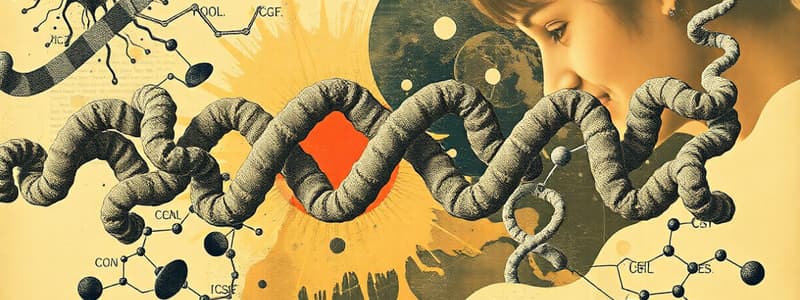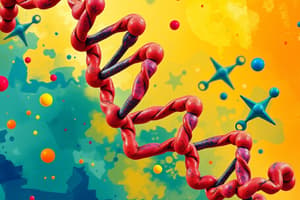Podcast
Questions and Answers
What is the main category of protein function that involves providing support and shape to cells and tissues?
What is the main category of protein function that involves providing support and shape to cells and tissues?
- Regulating body processes
- Transporting materials
- Providing structure (correct)
- Helping with immunity
Which type of protein is responsible for carrying oxygen in the blood?
Which type of protein is responsible for carrying oxygen in the blood?
- Hemoglobin (correct)
- Insulin
- Collagen
- Keratin
What type of bond is formed between amino acids to create proteins?
What type of bond is formed between amino acids to create proteins?
- Covalent bond
- Peptide bond (correct)
- Ionic bond
- Hydrogen bond
Which protein is primarily involved in providing structure to bones and connective tissues?
Which protein is primarily involved in providing structure to bones and connective tissues?
Which function of proteins is related to their role in maintaining the body's fluid balance?
Which function of proteins is related to their role in maintaining the body's fluid balance?
What role do enzymes play in the body?
What role do enzymes play in the body?
Which statement best describes how hemoglobin functions?
Which statement best describes how hemoglobin functions?
What determines the specific structure and function of a protein?
What determines the specific structure and function of a protein?
What is the consequence of a failure in maintaining fluid balance in the body?
What is the consequence of a failure in maintaining fluid balance in the body?
Which of the following proteins primarily serves a protective and structural role in the body?
Which of the following proteins primarily serves a protective and structural role in the body?
What do pattern recognition receptors (PRRs) do in the immune system?
What do pattern recognition receptors (PRRs) do in the immune system?
Enzymes serve what primary function in the body?
Enzymes serve what primary function in the body?
Which of the following statements about amino acids is true?
Which of the following statements about amino acids is true?
How are proteins used by the body in the absence of carbohydrates or fats?
How are proteins used by the body in the absence of carbohydrates or fats?
What are antibodies primarily involved in?
What are antibodies primarily involved in?
Flashcards
Protein Function
Protein Function
Proteins perform diverse roles in living organisms, including structural support, regulating processes, transporting materials, balancing fluids, supporting immunity, and providing energy.
Protein Structure
Protein Structure
Proteins are long chains of amino acids joined by peptide bonds.
Amino Acid
Amino Acid
Amino acids are the building blocks of proteins; they have an amino group and a carboxyl group.
Peptide Bond
Peptide Bond
Signup and view all the flashcards
Keratin
Keratin
Signup and view all the flashcards
Collagen
Collagen
Signup and view all the flashcards
Enzyme
Enzyme
Signup and view all the flashcards
Protein functions (6 major)
Protein functions (6 major)
Signup and view all the flashcards
What are structural proteins?
What are structural proteins?
Signup and view all the flashcards
What do enzymes do?
What do enzymes do?
Signup and view all the flashcards
Why are hormones important?
Why are hormones important?
Signup and view all the flashcards
What does hemoglobin transport?
What does hemoglobin transport?
Signup and view all the flashcards
How do proteins balance fluids?
How do proteins balance fluids?
Signup and view all the flashcards
Antibodies: what are they?
Antibodies: what are they?
Signup and view all the flashcards
Why is protein used for energy?
Why is protein used for energy?
Signup and view all the flashcards
Study Notes
Proteins: Structure, Function, and Composition
- Proteins are essential biomolecules found in all living organisms. They play a crucial role in various bodily processes, including digestion, cell activity, and oxygen transport.
- Proteins are composed of amino acids linked by peptide bonds, forming polypeptide chains. Approximately 20 different amino acids make up proteins.
- Protein structure is determined by the sequence of amino acids and subsequent folding, facilitated by hydrogen bonds.
Protein Functions
- Proteins perform six major functions:
- Providing structure: Collagen and keratin are examples of structural proteins crucial for supporting tissues like bones, skin, and hair.
- Regulating body processes: Enzymes, like those involved in digestion, accelerate chemical reactions. Protein hormones, such as insulin, regulate cellular functions.
- Transporting materials: Hemoglobin transports oxygen from the lungs to body tissues.
- Balancing fluids: Albumin and globulin help regulate fluid balance in the blood.
- Helping with immunity: Antibodies, PRRs (pattern recognition receptors), complement proteins, and interferons contribute to the immune response.
- Providing energy: Proteins are a source of energy when carbohydrates and fats are insufficient.
Protein Composition and Structure
- Proteins are chains of amino acids.
- Amino acids have an amino group and a carboxyl group. The differing 'R' group is what distinguishes amino acids.
- Protein structure is determined by the specific arrangement of amino acids and the resulting three-dimensional shape.
Detailed Protein Functions
- Providing Structure (Structural Proteins):
- Collagen is abundant in bones, connective tissues, and skin, providing strength.
- Keratin is found in hair, nails, skin, and organ linings, providing protection and structure.
- Regulating Body Processes (Enzymes & Hormones):
- Enzymes such as those in digestion accelerate reactions for optimal bodily function.
- Hormones like insulin affect metabolic processes and cell function.
- Transporting Materials (Transport Proteins):
- Hemoglobin facilitates oxygen transport in red blood cells.
- Other transport proteins move ions or molecules across membranes.
- Balancing Fluids (Fluid Balance Proteins):
- Albumin and globulin maintain fluid balance by attracting and retaining water in the blood. This is vital for metabolic function, as insufficient fluid balance can lead to problems in organs like the heart and kidneys.
- Helping with Immunity (Immune System Proteins): - PRRs (pattern recognition receptors) detect foreign invaders. - Antibodies target and neutralize foreign antigens. - Complement proteins and interferons support the immune response against infection.
- Providing Energy (Protein Breakdown):
- When insufficient carbohydrates or fats are available, proteins can be broken down for energy.
- This breakdown results in nitrogen waste (urea), which must be eliminated by the kidneys.
Studying That Suits You
Use AI to generate personalized quizzes and flashcards to suit your learning preferences.




